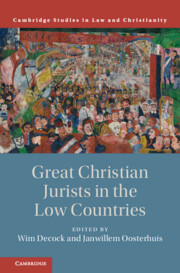Book contents
- Great Christian Jurists in the Low Countries
- Law and Christianity
- Great Christian Jurists in the Low Countries
- Copyright page
- Contents
- Contributors
- Introduction Law, Christianity, and Secularization in the Low Countries
- 1 Alger of Liège
- 2 Arnoldus Gheyloven
- 3 Boëtius Epo
- 4 Leonardus Lessius
- 5 Franciscus Zypaeus
- 6 Hugo Grotius
- 7 Paulus Voet
- 8 Ulrik Huber
- 9 Zeger-Bernard van Espen
- 10 Dionysius van der Keessel
- 11 Pieter Paulus
- 12 Guillaume Groen van Prinsterer
- 13 Edouard Ducpétiaux
- 14 Charles Périn
- 15 Léon de Lantsheere
- 16 Paul Scholten
- 17 Willem Duynstee
- 18 Jules Storme
- 19 Herman Dooyeweerd
- 20 Josse Mertens de Wilmars
- Index
- References
7 - Paulus Voet
Published online by Cambridge University Press: 16 September 2021
- Great Christian Jurists in the Low Countries
- Law and Christianity
- Great Christian Jurists in the Low Countries
- Copyright page
- Contents
- Contributors
- Introduction Law, Christianity, and Secularization in the Low Countries
- 1 Alger of Liège
- 2 Arnoldus Gheyloven
- 3 Boëtius Epo
- 4 Leonardus Lessius
- 5 Franciscus Zypaeus
- 6 Hugo Grotius
- 7 Paulus Voet
- 8 Ulrik Huber
- 9 Zeger-Bernard van Espen
- 10 Dionysius van der Keessel
- 11 Pieter Paulus
- 12 Guillaume Groen van Prinsterer
- 13 Edouard Ducpétiaux
- 14 Charles Périn
- 15 Léon de Lantsheere
- 16 Paul Scholten
- 17 Willem Duynstee
- 18 Jules Storme
- 19 Herman Dooyeweerd
- 20 Josse Mertens de Wilmars
- Index
- References
Summary
Paulus Voet (alias Paulus Voetius) is probably the least well known of three generations of the Voet family. His father was the famous reformed theologian Gijsbert Voet (alias Gisbertus Voetius, 1589–1676) and his son was Jan Voet (alias Johannes Voetius, 1647–1713), the famous exponent of Roman–Dutch law. Paulus Voet however was a formidable academic himself. This paper will throw light on the life and works of Paulus Voet from the perspective of his work as a Christian jurist during the seventeenth century in the Dutch Republic.
- Type
- Chapter
- Information
- Great Christian Jurists in the Low Countries , pp. 123 - 138Publisher: Cambridge University PressPrint publication year: 2021

